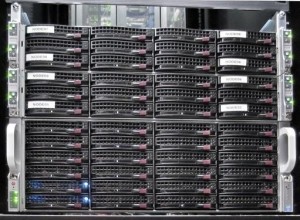Information Services have installed a High Performance Computer (HPC) called Solon, which can be used for research and teaching purposes. Anyone at City involved in teaching or research can request an account through the IT Service Desk.

The HPC works by networking 160 processor cores through a high speed network called infiniband. For comparison, the average desktop PC will have between one and four processor cores.
The advantage of such a large number of processor cores is that the HPC will be able to run programs that make use of parallel execution much more quickly than on a desktop PC. This allows the HPC to finish a job in hours that could have taken weeks on the average PC.
The HPC can be used for a variety of tasks, including financial modelling, finite element analysis and computational fluid dynamics. A number of applications have already been installed, including Matlab, Ansys, Starccm+ and Python.
We met with City University PG research student Veronika Witzke, who told us about some of the research she has been doing with the HPC.
Veronika’s work is in fluid dynamics, specifically looking at the shield flows of the sun. This involves calculating the way in which a liquid or gas would flow within given parameters. The HPCs many cores make this type of work much faster, as they make the HPC capable of running more tasks simultaneously. Veronika simulates a box of infinite length, and then divides this box into a number of layers. A core would be responsible for its own layer, calculating the way in which the liquid or gas might move in this layer. Since each layer can be simulated by a different core, each core will have a smaller task to complete. As a result, the average job can be completed in 2-3 hours instead of 24 hours on her desktop PC. This is known as parallel execution.
The HPC isn’t just useful for parallel execution or large simulations; it can also be very useful for a large number of small, similar jobs. Users can write a program that would instruct the HPC to carry out these small jobs simultaneously, saving the user a great deal of time.
If you are interested in making use of this resource, or would like to learn more about high performance computing, please visit: http://solon.city.ac.uk, or email: hpc@city.ac.uk
